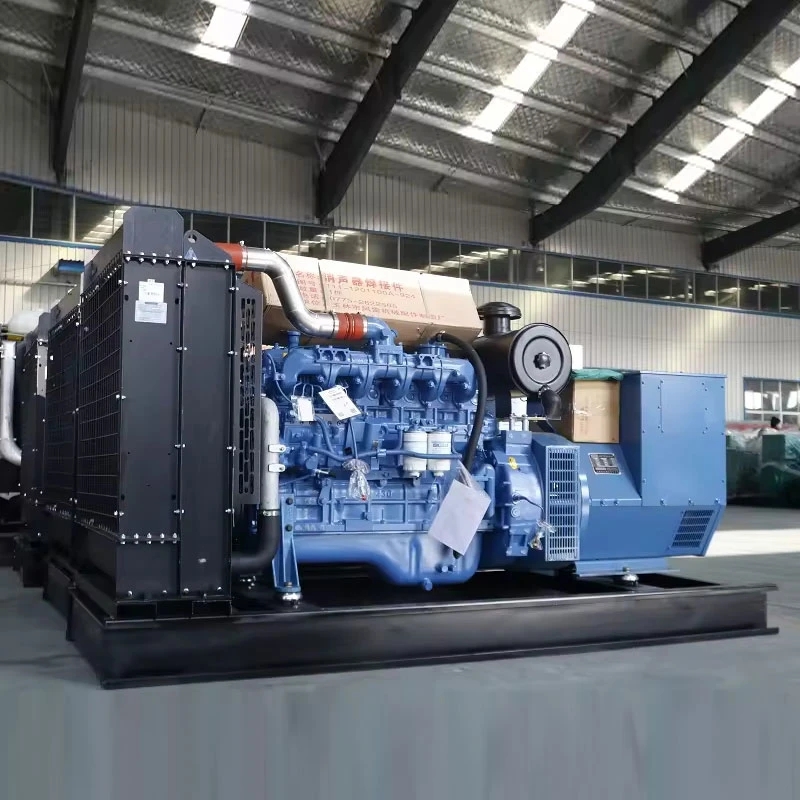Diesel Generators for Corrosive Atmospheres Ensuring Reliable Power Supply in Challenging Environments
Introduction In industrial settings, power outages can lead to significant disruptions and financial losses. To mitigate this risk, many facilities rely on diesel generators to provide backup power during emergencies. However, in environments with corrosive atmospheres, such as chemical plants, offshore platforms, and coastal areas, standard diesel generators may not be suitable due to the increased risk of corrosion and damage. In this article, we will explore the challenges of operating diesel generators in corrosive atmospheres and discuss the key considerations for selecting and maintaining generators that can withstand these harsh conditions. Challenges of Corrosive Atmospheres Corrosive atmospheres pose a significant threat to the reliability and longevity of diesel generators. The presence of corrosive elements, such as salt, moisture, gases, and chemicals, can accelerate the degradation of critical components, leading to premature failure and costly downtime. Some of the common challenges faced when operating diesel generators in corrosive atmospheres include: 1. Corrosion of metal components: The exposure to corrosive elements can cause rust and corrosion on metal parts of the generator, such as the engine block, fuel system, and electrical components. This can weaken the structural integrity of the generator and compromise its performance. 2. Degradation of insulation materials: Corrosive atmospheres can also degrade the insulation materials used in the generator, such as wiring, cables, and seals. This can lead to electrical faults, short circuits, and potential safety hazards. 3. Reduced efficiency and power output: Corrosion and damage to critical components can result in reduced efficiency and power output of the generator. This can impact the ability of the generator to provide reliable backup power during emergencies. 4. Increased maintenance requirements: Operating diesel generators in corrosive atmospheres necessitates more frequent inspections, cleaning, and maintenance to prevent corrosion and ensure optimal performance. This can result in higher maintenance costs and increased downtime for the generator. 150KW Diesel Generator For Sale for Diesel Generators in Corrosive Atmospheres To overcome the challenges of operating diesel generators in corrosive atmospheres, it is essential to consider the following key factors when selecting and maintaining generators for use in these environments: 1. Corrosion-resistant materials: When choosing a diesel generator for a corrosive atmosphere, it is crucial to opt for models that are constructed from corrosion-resistant materials, such as stainless steel, galvanized steel, or aluminum. These materials have superior resistance to rust and corrosion, ensuring the longevity and reliability of the generator in harsh environments. 2. Protective coatings and finishes: Applying protective coatings and finishes to the generator components can help to enhance their resistance to corrosion. Epoxy coatings, powder coatings, and chemical-resistant paints are commonly used to protect metal surfaces from corrosive elements. 3. Sealed enclosures and gaskets: Sealed enclosures and gaskets can help to prevent the ingress of moisture, salt, and other corrosive agents into the generator components. It is essential to ensure that the generator is properly sealed to minimize the risk of corrosion and damage. 4. Stainless steel exhaust systems: The exhaust system of a diesel generator is particularly vulnerable to corrosion due to the high temperatures and corrosive gases produced during operation. Using a stainless steel exhaust system can help to prevent rust and corrosion, ensuring the longevity of the generator. 5. Regular maintenance and inspections: To ensure the optimal performance and longevity of a diesel generator in a corrosive atmosphere, regular maintenance and inspections are essential. This includes cleaning the generator, checking for corrosion, replacing worn parts, and testing the generator under load conditions.  6. Proper ventilation and air filtration: Adequate ventilation and air filtration are crucial for diesel generators operating in corrosive atmospheres. Proper ventilation helps to remove corrosive gases and moisture from the generator enclosure, while air filtration prevents contaminants from entering the engine and causing damage. 7. Monitoring and remote diagnostics: Implementing a remote monitoring system for the diesel generator can help to detect potential issues early and prevent costly downtime. Remote diagnostics allow operators to monitor the generator's performance, fuel levels, and critical parameters from a central location, enabling timely maintenance and troubleshooting. Conclusion Operating diesel generators in corrosive atmospheres presents unique challenges that require careful consideration and proactive measures to ensure reliable backup power supply. By selecting generators constructed from corrosion-resistant materials, applying protective coatings, maintaining proper ventilation, and implementing remote monitoring systems, facilities can mitigate the risks associated with corrosion and prolong the lifespan of their generators. Investing in high-quality diesel generators specifically designed for corrosive atmospheres is essential for maintaining uninterrupted power supply in challenging environments.
6. Proper ventilation and air filtration: Adequate ventilation and air filtration are crucial for diesel generators operating in corrosive atmospheres. Proper ventilation helps to remove corrosive gases and moisture from the generator enclosure, while air filtration prevents contaminants from entering the engine and causing damage. 7. Monitoring and remote diagnostics: Implementing a remote monitoring system for the diesel generator can help to detect potential issues early and prevent costly downtime. Remote diagnostics allow operators to monitor the generator's performance, fuel levels, and critical parameters from a central location, enabling timely maintenance and troubleshooting. Conclusion Operating diesel generators in corrosive atmospheres presents unique challenges that require careful consideration and proactive measures to ensure reliable backup power supply. By selecting generators constructed from corrosion-resistant materials, applying protective coatings, maintaining proper ventilation, and implementing remote monitoring systems, facilities can mitigate the risks associated with corrosion and prolong the lifespan of their generators. Investing in high-quality diesel generators specifically designed for corrosive atmospheres is essential for maintaining uninterrupted power supply in challenging environments.